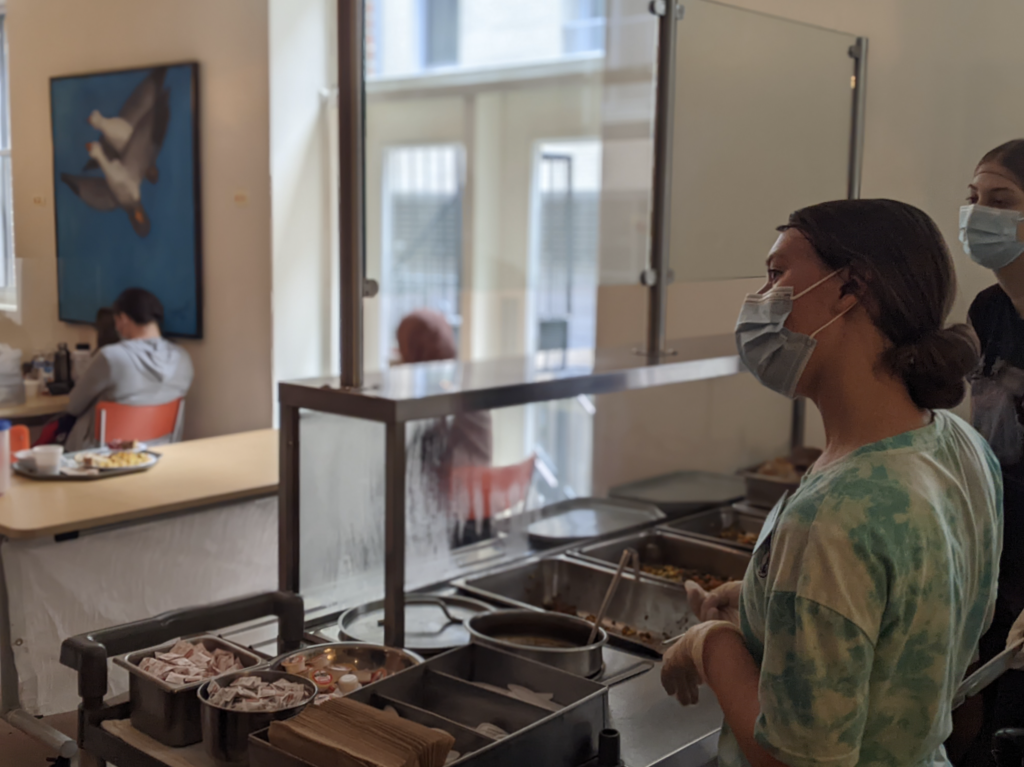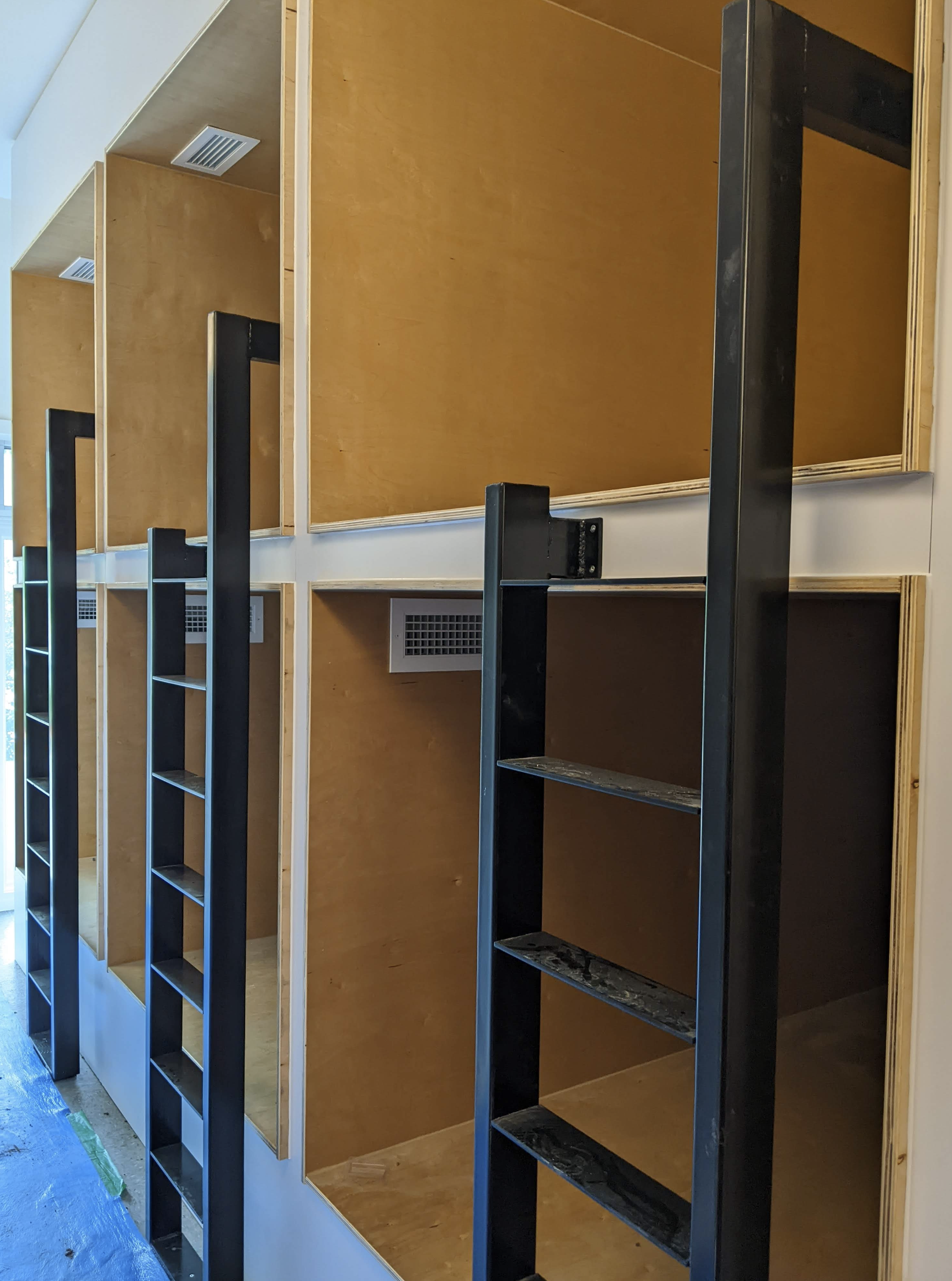Growing Chez Doris: How One Montreal Women’s Shelter is Tackling the Surge in Homelessness

Between the “she-demic” and the inflation economy, more women are being marginalized. The director of Montreal’s downtown women’s shelter, Chez Doris, reports from the front line of economic precariousness.
Marina Boulos-Winton
July 20, 2022
After more than two years of economic disruption, social isolation and normalized death wrought by the worst global pandemic in more than a century, people around the world are now coping with a tough new economic reality.
Most of us can relate: The highest inflation rate in more than 40 years, astronomical rent increases, gas price increases, food-price sticker shock, all amid fears of a recession. We process the news through the prism of how directly those numbers could impact our own quality of life, and the quality of life of those we love.
I am the Executive Director of Chez Doris, a women’s shelter located in downtown Montreal. Any readers familiar with us will know Chez Doris as a day shelter — a safe, no-questions-asked haven offering hot meals, clothing, activities as well as health and mental health services to women in need.
So, I relate to those numbers differently because the women we work with are being disproportionately pummelled by poverty, and often work minimum-wage jobs without security, when they can work. Many are single parents, live off of meagre fixed incomes, or both.

Chez Doris opened its doors in 1977, named after a destitute mother of four who was found murdered; a victim of life on the street. It was not until 2020 that we began offering shelter around the clock to “an exploding population of women falling into homelessness,” per a recent Montreal Gazette article on our expanded services.
This means that my relationship to the series of stunning cost-of-living numbers we’re all familiar with has been more urgent, and perhaps more tangible, amid a recent 50 percent rise in homeless clients, than “Do I need to cancel my trip to Maine?” or “Do I need to cut back to one restaurant dinner a week?”
The women hardest hit by the socioeconomic impacts of what has been dubbed a “she-demic” for its gender bias are living, breathing human beings who can experience statistical shifts in economic indicators as the difference between hope and despair — and sometimes between life and death. So, the questions we ask ourselves at Chez Doris, amid record-busting inflation and housing costs are, “How many cots can we squeeze into an office after working hours?” and, “How can we offer more services to marginalized women when physical distancing rules still apply?”
For more than four decades, Chez Doris worked primarily to prevent homelessness and provided a wide range of programs, socio-recreational activities, housing placement and ongoing follow-up services. Women who are homeless largely reflect a familiar profile — a lack of affordable housing, eviction, untreated mental illnesses, addictions, trauma, abuse, violence, unemployment, a major financial setback such as a divorce or death of a spouse, debts, and those with a weak or non-existent social network.
In the nearly five years from April 2017 to March 2020, the average number of women coming to Chez Doris daily grew by 20 percent and the number of women asking for showers and emergency clothing doubled. This is an indication in the rise of homelessness, as more than 95 percent of the women who ask for these services don’t have a fixed address. While we typically saw 1,500 – 1,800 different women a year before the rise of COVID, of those women, 225 to 450 were homeless. Since the pandemic, we see fewer women at a time but with operating hours increased from 7 hours a day to 24 hours a day. We still see 1,500 different women per year, but now more than 900 of them are homeless.
While the pandemic has exposed how prevalent homelessness is for women, those who are vulnerable to becoming homeless feel abandoned. Generally, the positive job numbers coming out of the pandemic make no difference to them, but the cost-of-living numbers do. Those who used to come to us daily to eat meals, partake in social recreational activities to break out of isolation, or who could readily speak with a caseworker in person, no longer have daily access to these services. There is a lack of room, staff, and funding to help everyone, and those who are homeless need to take precedence. Unfortunately, those who are chronically homeless and not autonomous are utilizing space that could be used by those who are vulnerable to becoming homeless, as well as those who are newly homeless.
With a lack of community space, of emergency beds, of social as well as affordable housing, the charitable sector is being called upon by our governments to do more. Charities such as Chez Doris are being pressed upon to meet the needs of a growing number of homeless women of all ages, who have children, who are racialized or Indigenous, and who have no safety nets. Can the charitable sector really fix a broken system by itself?

Some poverty relief organizations have doubled, tripled, or quadrupled their budgets during the pandemic. Meanwhile, the problems exacerbated by COVID continue while the extra government pandemic funding has largely ceased as of July 1st. Organizations that have not also sought help from the private sector risk having their added pandemic services fold due to lack of funding. As a result, people seeking help from the charitable sector will literally be left out in the cold.
Early in the pandemic, we launched a major campaign called Chez Doris Day and Night: with a goal of $10 million in private sector support, in addition to the $5 million in government sector support over a period of 5 years.
Our aim was to launch an emergency shelter for homeless women with 24 beds, and a permanent residence with 26 studio apartments in a building owned by the Société d’habitation de Montréal, a para-municipal organization that creates housing. Among other changes, we’ve added 22 Japanese-style sleeping compartments.
We became 24-hour service two years sooner than planned, thanks in large part to government COVID funding. Our operating budget went from $2.3 million with 26 employees to $6.3 million with 65 employees by virtue of offering emergency shelter services from a hotel, expanded housing search services, increased staff, and round-the-clock cleaning to keep the virus at bay. These needs have not gone away, and our plans for private funds to kick in have begun. But with soaring costs, we wonder if charities such as ours can maintain financial sustainability as government funding initiatives and policies are not only profoundly impacting Canadians who need help but also reshaping some organizations.
Here are some of our examples:
• We will likely take advantage of more government grants such as the Programme supplement au loyer (PSL), whereby we search for apartments in the private market, while the tenant pays a rent equivalent to 25 percent of their household income and the Office Municipale d’habitation de Montréal pays the balance of the lease. Recently, only 130 PSLs were made available to organizations helping the homeless. Last year, for 45 spots allotted to us, we received 210 applications. But there are not enough PSLs to respond to the demand for affordable housing, half of the applicants do not qualify for the application process, and many are not autonomous enough to live on their own. In a nutshell, there are many kinds of people who have nowhere to go at night, and that means that more flexible funding programs are needed.
• We’re waiting for the next renewal of our Reaching Home grants for homeless Indigenous women to be placed in the private housing market, a program we’ve had since 2015. But since 2015, these grants have been cobbled together and are never assured nor increased. With monthly social assistance rates of $726 for a single person, it is impossible to find an apartment and pay for living expenses anywhere in Montreal or outside of it.
• We’ve also been accepted for the last two rounds of funding for the Rapid Housing Initiative, which addresses the urgent housing needs of vulnerable Canadians, with which we plan to create permanent housing for 40-58 women within a year.
In terms of red tape, many federal grants, including those for brick-and-mortar projects, must be spent within a year of signing the agreements. This has meant that even though the Canada Mortgage and Housing Corporation committed $1,616,291 of funding for Chez Doris, we deliberately did not sign its contract, and have spent the entirety of this grant from our own funds in construction costs for our homeless shelter to see through the project. We signed the contract when the project is almost completed, and await to be reimbursed.
Also, with construction costs at an all-time high, organizations are left with the bill for cost overlays. In our case, another building with $4,916,830 in CMHC funding for buying and renovating a commercial building for housing, the cost overlays are $1 million for Chez Doris. The deadlines to convert commercial buildings into housing within one year of signing a Rapid Housing Initiative contract are simply not realistic. High-need populations with psychiatric problems necessitating support will be left out of these new housing initiatives as buildings need more than a year to be renovated and brought to code to accommodate these residents.
Further impeding expansion projects is the turnover rate of qualified staff since the pandemic. These workers are leaving for similar positions in the public sector that pay 20 percent to 60 percent more for the same work in a hospital or community clinic. Given the job market, we are now left with fresh recruits just out of school who must be trained in basic skills such as how to obtain IDs, apply for welfare and advise others on tenant rights.
In order to prevent many vulnerable Canadians and Quebecers from becoming homeless, and help those who already are, what we need from our governments is: more assured funding for organizations still affected by the pandemic; increased and more flexible housing subsidies; the removal of the one-year deadline to spend received funds; and investment in training for new recruits who are in the helping professions.
In turn, the charitable sector will rise to the challenge. The will is there, all we need are the means.
To make a donation to Chez Doris, click here.
Marina Boulos-Winton, Executive Director of Chez Doris, has worked for three decades with charitable and advocacy organizations representing the interests of vulnerable populations.
